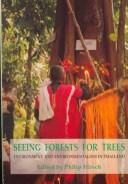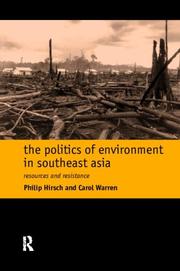| Listing 1 - 9 of 9 |
Sort by
|

ISBN: 9743900071 Year: 1997 Publisher: Chiang Mai Silkworm books
Abstract | Keywords | Export | Availability | Bookmark
 Loading...
Loading...Choose an application
- Reference Manager
- EndNote
- RefWorks (Direct export to RefWorks)
Contents emerged from a conference and follow-up workshop at the Asia Research Centre on Social, Political, and Economic Change at Murdoch University.
Environmental degradation --- Environmentalism --- Thailand --- Environmental conditions.
Book
ISBN: 0295750472 Year: 2022 Publisher: Seattle : University of Washington Press,
Abstract | Keywords | Export | Availability | Bookmark
 Loading...
Loading...Choose an application
- Reference Manager
- EndNote
- RefWorks (Direct export to RefWorks)
"In Southeast Asia reversals of earlier agrarian reforms have rolled back "land-to-the-tiller" policies created in the wake of Cold War-era revolutions. This trend, marked by increased land concentration and the promotion of export-oriented agribusiness at the expense of smallholder farmers, exposes the convergence of capitalist relations and state agendas that expand territorial control within and across national borders. Through the lens of land capitalization, Turning Land into Capital examines the contradictions produced by superimposing twenty-first-century neoliberal projects onto diverse landscapes etched by decades of war and state socialism. Chapters in the book explore geopolitics, legacies of colonialism, ideologies of development, and strategies to achieve land justice in Cambodia, Laos, Myanmar, Thailand, and Vietnam. The resulting picture reveals the place-specific interactions of state and market ideologies, regional geopolitics, and local elites in concentrating control over land"--
Book
ISBN: 0195889681 Year: 1990 Publisher: Singapore New York : Oxford University Press,
Abstract | Keywords | Export | Availability | Bookmark
 Loading...
Loading...Choose an application
- Reference Manager
- EndNote
- RefWorks (Direct export to RefWorks)

ISBN: 0415172993 0415172985 0203030176 0203267966 1280330856 1134690452 9780203267967 1134690444 Year: 1998 Publisher: London Routledge
Abstract | Keywords | Export | Availability | Bookmark
 Loading...
Loading...Choose an application
- Reference Manager
- EndNote
- RefWorks (Direct export to RefWorks)
The Politics of Environment in Southeast Asia charts the emergence of the environment as an issue of public debate in the region. Through a series of case studies the authors explore the coalescence of social forces around environmental issues, the process of alliance formation, and the role of state institutions, media and NGOs in the complex political battles over resource allocation.The volatile tensions between the winners and losers in this struggle for the environment will make Southeast Asia a focus of increased attention.
Environmental policy --- Environmental protection --- Natural resources --- Conservation of natural resources --- Environmental aspects --- Economic aspects --- Conservation of resources --- Natural resources conservation --- Resources conservation, Natural --- National resources --- Resources, Natural --- Conservation --- Natural resources conservation areas --- Resource-based communities --- Resource curse
Book
ISBN: 9048512875 9789048512874 9089642498 9789089642493 9789089642493 Year: 2010 Publisher: Amsterdam Amsterdam University Press
Abstract | Keywords | Export | Availability | Bookmark
 Loading...
Loading...Choose an application
- Reference Manager
- EndNote
- RefWorks (Direct export to RefWorks)
This book traces the threads that tie together an understanding of Thailand as a dynamic and rapidly changing society, through an examination of the work of one major scholar of the country, Andrew Turton. Turton's anthropological studies of Thailand cover a wide spectrum from politics and economy to ritual and culture, and have been crucial in shaping evolving models of Thai society.In this collection, ten leading specialists on Thailand from a variety of disciplines critically consider aspects of Turton's work in relation to the changing nature of different aspects of Thai society. The book
Social sciences. --- Turton, Andrew. --- Thailand --- History. --- Politics and government.
Book
ISBN: 9780824836030 0824836030 Year: 2011 Publisher: Honolulu: University of Hawai'i Press,
Abstract | Keywords | Export | Availability | Bookmark
 Loading...
Loading...Choose an application
- Reference Manager
- EndNote
- RefWorks (Direct export to RefWorks)
Questions of who can access land and who is excluded from it underlie many recent social and political conflicts in Southeast Asia. Powers of Exclusion examines the key processes through which shifts in land relations are taking place, notably state land allocation and provision of property rights, the dramatic expansion of areas zoned for conservation, booms in the production of export-oriented crops, the conversion of farmland to post-agrarian uses, "intimate" exclusions involving kin and co-villagers, and mobilizations around land framed in terms of identity and belonging. In case studies drawn from seven countries, the authors find that four "powers of exclusion"-regulation, the market, force, and legitimation-have combined to shape land relations in new and often surprising ways. Land debates are often presented as a conflict between market-oriented land use with full private property rights on the one side, and equitable access, production for subsistence, and respect for custom on the other. The authors step back from these debates to point out that any productive use of land requires the exclusion of some potential users, and that most projects for transforming land relations are thus accompanied by painful dilemmas. Rather than counterposing "exclusion" to "inclusion," the book argues that attention must be paid to who is excluded, how, why, and with what consequences.
Land reform --- Land use, Rural --- Land tenure --- Agriculture and state --- Réforme agraire --- Utilisation agricole du sol --- Propriété foncière --- Politique agricole --- #SBIB:39A73 --- #SBIB:39A4 --- Agrarian question --- Agricultural policy --- Agriculture --- State and agriculture --- Economic policy --- Agrarian tenure --- Feudal tenure --- Freehold --- Land ownership --- Land question --- Landownership --- Tenure of land --- Real property --- Land, Nationalization of --- Landowners --- Serfdom --- Rural land use --- Land use --- Agrarian reform --- Social policy --- Etnografie: Afrika --- Toegepaste antropologie --- Government policy --- Réforme agraire --- Propriété foncière --- Land reform - Southeast Asia --- Land use, Rural - Southeast Asia --- Land tenure - Southeast Asia --- Agriculture and state - Southeast Asia
Book
ISBN: 9789971695415 Year: 2011 Publisher: Singapore : NUS,
Abstract | Keywords | Export | Availability | Bookmark
 Loading...
Loading...Choose an application
- Reference Manager
- EndNote
- RefWorks (Direct export to RefWorks)
Book

ISBN: 9789812306845 Year: 1994 Publisher: Singapore
Abstract | Keywords | Export | Availability | Bookmark
 Loading...
Loading...Choose an application
- Reference Manager
- EndNote
- RefWorks (Direct export to RefWorks)
Digital

ISBN: 9789812306845 Year: 1994 Publisher: Singapore ISEAS Publishing
Abstract | Keywords | Export | Availability | Bookmark
 Loading...
Loading...Choose an application
- Reference Manager
- EndNote
- RefWorks (Direct export to RefWorks)
| Listing 1 - 9 of 9 |
Sort by
|

 Search
Search Feedback
Feedback About UniCat
About UniCat  Help
Help News
News